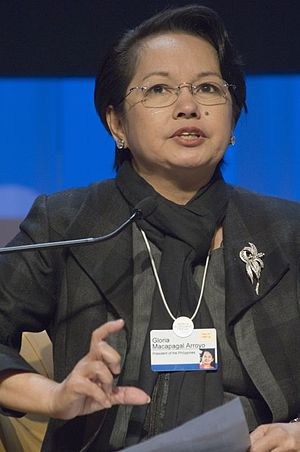 Image via Wikipedia
Image via WikipediaThe law seeks to make Filipino children less vulnerable to the illicit trade by imposing stiff penalties on anyone found guilty of any form of involvement in child pornography and enjoining private entities to help in the effort.
As the law defines it, child pornography is any representation, by whatever means, of a child engaged or involved in real or simulated sexual activities.
The law mandates that child pornography victims be given emergency shelter or appropriate housing, counseling, free legal services, medical or psychological services, livelihood and skills training, and educational assistance.
By signing the law, the President has demonstrated the government’s compliance with different international treaties such as the Rights of the Child; the Optional Protocol to the Convention on the Rights of the Child on the Sale of Children, Child Prostitution and Child Pornography; the International Labor Organization (ILO) Convention No. 182 on the Elimination of the Worst Forms of Child Labor and the Convention Against Transnational Organized Crime.
The penalties for violating the child pornography law range from arresto mayor to reclusion perpetua and a fine of between P300,000 to P5 million, depending on the gravity of the offense.
It provides that a victim of child pornography shall be considered as a victim of a violent crime, and metes out penalties ranging from mayor to reclusion perpetual and a fine of 300,000 to 5 million pesos.
The new law criminalizes hiring, employing, using, persuading, inducing or coercing a child to participate in the production or any form of child pornography; and any form of involvement in creating any form of child pornography.
It also criminalizes publishing, offering, transmitting, selling, distributing, broadcasting, advertising, promoting, exporting or importing any form of child pornography; possessing any form of child pornography with the intent of selling, distributing, publishing or broadcasting them; and possessing and willfully accessing any form of child pornography.
Under the law, Internet service providers (ISP) must report to the Philippine National Police or the National Bureau of Investigation (NBI) within seven days from obtaining facts and circumstances that any form of child pornography is being committed using its server or facility.
To monitor compliance, the law creates an Inter-Agency Council against Child Pornography to be headed by the Department of Social Welfare and Development.
Members of the council are the heads of the Department of Justice, Department of Labor and Employment, Department of Science and Technology, Philippine National Police, Commission on Human Rights, Commission on Information and Communication Technology, National Telecommunications Commission, Council for the Welfare of Children, Philippine Center on Transnational Crime, Optical Media Board and NBI.





No comments:
Post a Comment